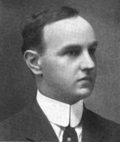Julius Meier
| Julius Meier | |
|---|---|

Meier in 1911
|
|
| 20th Governor of Oregon | |
|
In office January 12, 1931 – January 14, 1935 |
|
| Preceded by | A. W. Norblad |
| Succeeded by | Charles H. Martin |
| Personal details | |
| Born |
December 31, 1874 Portland, Oregon |
| Died | July 14, 1937 (aged 62) Corbett, Oregon |
| Political party | Independent |
| Spouse(s) | Grace Mayer |
| Profession | Merchant |
Julius L. Meier (December 31, 1874 – July 14, 1937) was an American businessman, civic leader, and politician in the state of Oregon. The son of the Meier & Frank department store founder, he would become a lawyer before entering the family business in Portland. Politically an independent, Meier served a single term as the 20th Governor of Oregon from 1931–1935. He is the only independent to be elected Governor of Oregon.
Meier was born in Portland to German immigrants of Jewish ancestry: Aaron, a merchant and founder of Oregon's largest department store, Meier & Frank, and Jeannette (Hirsch) Meier. He had three siblings, and was the father of Jean Ellen Meier Ehrman Reichert, Elsa Frances Meier Ganz, and Julius L. (Jack) Meier, Jr. He married Grace Mayer on Christmas Day, 1901, saying afterwards that it was the only day that he was allowed off from the store.
Meier graduated from the University of Oregon School of Law in 1895 and practiced law with a partner, George W. Joseph for the next four years, until he went into the family's business. According to family tradition, it was at this time that he added the "L" to his name; the sign painter, who was putting his name on the door, insisted that all lawyers of substance had one and Meier suggested an "L".
Meier devoted 30 years to civic involvement before entering elective politics. A noted philanthropist, he also kept a high profile leading many good causes. During World War I, he headed Liberty Loan drives, served as regional director of the Council of National Defense, and after the war aided in the rehabilitation of France. He also headed the Oregon Commission of the 1915 Panama–Pacific International Exposition in San Francisco, and in 1922 attempted to bring a world's fair to Portland in 1925.
An important accomplishment was his leading the Columbia River Highway Association, the citizen committee creating political support for building the Columbia River Highway, first west from Portland to Astoria (1912–1915) and later east from Portland to The Dalles (1913–1922). His daughter, Jean, would later recall that he walked or crawled every inch of the highway's projected roadway.
...
Wikipedia
